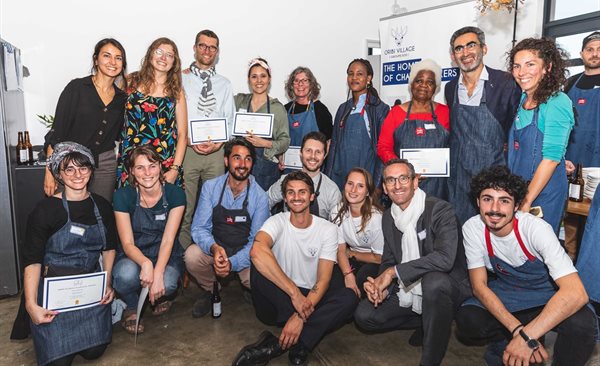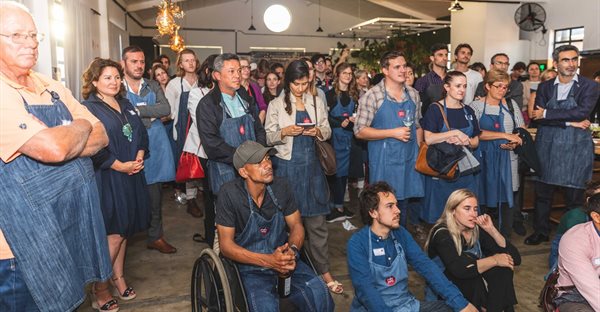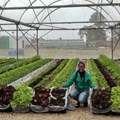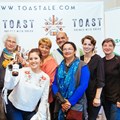A small group of South Africa's most promising social entrepreneurs just emerged from the first Oribi Village Food System Incubation Programme, hosted in Cape Town.

From left to right: Christopher D’Aiuto (PEDI), Zodidi Meke (PEDI), Loubie Rusch (Making KOS), Arnaud Blanchet (Shopit), Ria Schuurman (Ubuhle Bendalo), Bianca Hansen (Toast Ale) and Emma (Umthunzi Farming Community). Mhani Gingi's Lillian Masebenza not present.
The incubator was developed by non-profit company Oribi Village to support and promote local innovators who are helping to build a more efficient, inclusive, sustainable and resilient food system from farm to fork.
Why tackle the food system?
According to Oribi Village, food insecurity should not be handled as a production problem only, but as a result of a dysfunction in the food system, one of the core causes being financial and geographical accessibility.
In 2018, 29 million people in South Africa were forced to make compromises on the quality and/or quantity of the food consumed. "This situation is unacceptable for the human development capacity, moreover, if we focus on the immense quantity of global food production and food waste," notes the non-profit.

Food System Incubation Programme graduates with French diplomats and representatives from Oribi Village.
Developing sustainable businesses
The incubator programme spanned the best part of a year, and sought to address three business challenges: operational excellence, supply chain orchestration, and transparency. It included individual mentoring sessions, weekly workshops, masterclasses, access to Oribi's co-working space and participation in events to showcase the cohort's various products and services.
The goal was to equip the social entrepreneurs – all working in Cape Town and surrounding townships – with the tools and skills necessary to turn their idea into a sustainable business model.
A graduation event was held at Food Jams in Salt River last week to mark the closure of the first Food System Incubation Programme. A new version is launching in January 2020 in collaboration with the Southern Africa Food Lab.

Graduation event at Food Jams
Meet the Food System Programme cohort
Shopit – Arnaud Blanchet
Shopit is a mobile app that improves the efficiency and affordability of informal grocery stores. The platform enables spaza shop owners to compare prices at wholesalers in their area, order all their stock directly from their phone at the best price and get it delivered to their doorstep within a few hours.
While the informal retail sector is growing faster than formal retail, spaza store owners often lack formal business skills and access to affordable stock. As a result, these stores can be inefficient and their low-income clients encounter high prices and regular out-of-stock.
Using Shopit, traders can save between 5 to 10% on the cost of their stock. By being able to order stock as often as they need, it reduces the out-of-stock occurence and enables low-income consumers to get better access to the products and services they need.
Philippi Economic Development Initiative (PEDI) – Christopher D’Aiuto
PEDI is a social enterprise giving emerging and small-scale organic farmers (urban and rural) easier access to the market while training them in the profession.
Essentially, PEDI's solution is to focus primarily on the farmers’ needs and to create an access to market by: providing training to the farmers; aggregating what the small-scale farmers can provide, to ensure consistency for the clients; offering a logistics solution to the isolated farmers; and adding value to the produce in a packing space.
Mhani Gingi – Lillian Masebenza
Instead of retiring, Lillian Masebenza developed Mhani Gingi, a social entrepreneurial network that uses urban agriculture, arts & craft and hospitality & tourism business opportunities to economically empower vulnerable groups from the Cape Flats, including at-risk youth, people with disabilities, the elderly and abused women.
The urban agriculture programme supports these groups to develop and maintain their own food gardens by providing inputs (land, seedlings, etc.), skills-training and market access.
Since 2004, Mhani Gingi has impacted 10,000 people by supporting 50 projects working to eradicate poverty.
Umthunzi Farming Community – Emma Hosking and Kim Bloch
Umthunzi Farming Community is an e-marketplace that economically empowers small-scale farmers through marketing, sales and distribution of their seasonal, locally-grown organic vegetables, eggs and herbs. It sells a weekly Umthunzi Harvest Bag filled with seasonal, organic produce available at local collection points.
The empowerment of the farmers includes encouraging ownership of the systems by the farmers themselves through training and a long process of getting the farmers to be responsible for their availability list. Extensive research on pricing has been done so that farmers receive a fair share of what they work for.
Umthunzi is working towards building a strong community network of farmers, volunteers, consumers, and other stakeholders.
Making Kos – Loubie Rusch
Making Kos is a local indigenous food market that engages people to know about, grow and use forgotten edibles from the Western Cape. The business was created to be mutually beneficial to small scale farmers, cooks and the land. The indigenous foods market will improve livelihoods while reducing resource use and will bring exciting new ingredients back into use while supporting, rather than taxing, our biodiversity.
Rusch facilitates workshops and talks to bring awareness and know-how around these ingredients, and collaborates with researchers to explore opportunities for communities to develop livelihoods from cultivating local indigenous foods. She also engages with small-scale farmers, chefs and cooks to establish a market to support this cultivation.
Making Kos will soon be launching an indigenous food meal-kit box in partnership with UCook.
Toast Ale – Bianca Hansen
Toast Ale is a food waste initiative that transforms fresh surplus bread into low-calorie craft beer to create economic value and to reduce methane gas emissions. Toast Ale partnered with commercial sandwich factories and local bakeries, like Knead, to take over their surplus and use it to replace one-third of the malt in the beer. Profits from Toast Ale have been donated to charity.
Unfortunately, Toast Ale is no longer operating in South Africa, but founder Bianca Hansen has embarked on a new business project focused on waste innovation on a wider scale.
Ubuhle Bendalo Food Gardens – Ria Schuurman
Ubuhle Bendalo is a productive food garden in Khayelitsha Site B that grows and sells organic vegetables and herbs. Ubuhle Bendalo also shares skills with the local community to encourage people to grow their own home gardens.
The initiative encourages responsible production, and promotes awareness around the origins of food.
Visit Oribi Village online for more information about their work in social entrepreneurship]].


























































